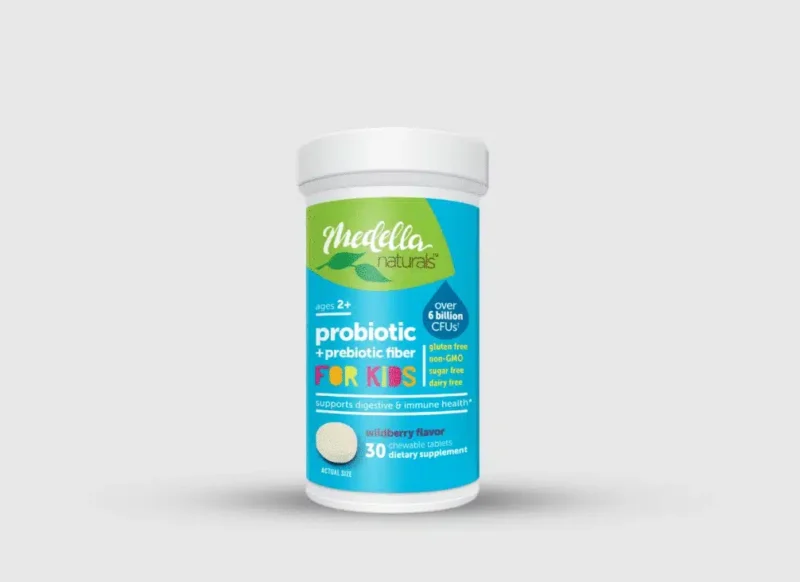In an era where unhealthy food options are prolific and tempting, ensuring our children maintain their gut health is becoming more challenging – a cornerstone of overall wellness. Enter the power of prebiotics. Not to be confused with probiotics, these essential dietary fibers hold immense potential in supporting kids’ gut health, boosting their immune system, and promoting optimal digestion. Dive into this blog post as we unravel the magic behind prebiotics for kids Ė your secret weapon against irregularities in digestion and much more!
Understanding Your Child’s Gut Microbiome and the Role of Probiotics and Prebiotics
Before discussing the importance of prebiotics for children, it’s essential to discuss your child’s gut microbiome and the significance of probiotics.
The human microbiome is a complex ecosystem comprising a delicate balance of beneficial and harmful gut bacteria and microorganisms. An imbalance, with excess harmful bacteria and a shortage of beneficial ones, can lead to various gastrointestinal issues and potential infections, ranging from mild to chronic.
Conversely, when the beneficial microorganisms maintain dominance, they play a crucial role in eliminating harmful bacteria. This balance within the gut microbiome is pivotal for overall health and well-being, particularly concerning the closely interconnected digestive and immune systems.
This intricate process begins within your child’s delicate digestive tract. To ensure that everything functions optimally, your little one requires a combination of probiotics and prebiotics in their diet. These elements are instrumental in supporting and maintaining their developing gut microbiome, contributing to their overall health and well-being.
What Are Prebiotics for Kids?
Prebiotics are nondigestible fibers that support beneficial bacteria found in the gut. They lead to healthier gut flora and stimulate the growth of healthy gut bacteria. Prebiotics serve as food for probiotics, allowing them to thrive, multiply, and perform other vital functions required by the body.
Prebiotics are naturally occurring and found in foods. However, sometimes, it may not be practical to alter one’s diet adequately to reap the full benefits of prebiotic intake – especially for picky eaters who refuse foods rich in prebiotics! Supplements like Growing Up Prebiotics can come to the rescue in such cases.
When Your Child Needs Prebiotic Supplements?
Your child may not have the words to explain how they feel physically, but their body language and behavior can tell you a lot. For example, holding their stomach or saying they feel uncomfortable could mean something is wrong.
Sometimes, stomach aches happen because of eating too many sweets, not wanting healthy food, or just wanting attention. As a parent, you should trust your instincts and notice other signs that might suggest something more serious. For example, you should investigate further if your child experiences:
- Stomach cramps
- Diarrhea
- Constipation
- Nausea
- Vomiting
- Excessive gas
- Bloating
- Acid reflux
- Irritable bowel syndrome (IBS)
- Frequent upper respiratory tract infections
- Colic
- Eczema
Whole Food Sources of Prebiotics for Kids
Ensuring that your child’s diet includes an adequate supply of prebiotics is essential for nurturing a healthy gut microbiome. Fortunately, prebiotics are naturally abundant in many everyday foods, offering many options. Here’s a closer look at some whole food sources of prebiotics that can benefit your child’s digestive health:
Fruits
Bananas: Known for their sweetness and creaminess, bananas are a kid-friendly source of prebiotics.
Apples: Apples contain prebiotic fibers that can support a balanced gut with their crisp texture and natural sweetness.
Berries: Various berries, such as strawberries, blueberries, and raspberries, are not only delicious but also rich in prebiotic compounds.
Grains
Oats: Oats are versatile grains that can be incorporated into breakfast cereals or baked goods, providing a good source of prebiotics.
Wheat: Whole wheat products like bread or pasta contain prebiotic fibers, making them a valuable addition to your child’s diet.
Barley: Another whole-grain option contributes to your child’s prebiotic intake.
Vegetables
Asparagus: These tender spears are nutritious and supply prebiotics supporting gut health.
Soybeans: Soybeans and products like tofu contain prebiotic compounds, making them suitable for plant-based diets.
Onion and Garlic: These aromatic ingredients are not only flavor enhancers but also excellent sources of prebiotics.
Cocoa
Cocoa, often found in chocolate and hot cocoa, contains prebiotic compounds that can add a touch of sweetness to your child’s diet while promoting gut health.
In addition to these whole foods, you may find products specifically fortified with prebiotics, such as yogurt, cereals, pasta, or snack bars. When checking ingredient labels, look for terms like “prebiotic fiber,” “inulin,” “oligosaccharides,” “chicory root extract,” or “beta-glucan.” These indicate that the product contains added prebiotics, which can conveniently boost your child’s intake.
Potential Adverse Effects of Prebiotics in Children
Introducing prebiotic fiber into your child’s diet can yield unintended consequences if administered excessively when their delicate digestive system is unaccustomed to it. This may lead to discomforts such as bloating, gas, or complaints of an upset stomach. To mitigate these potential side effects, it is advisable to introduce prebiotics gradually and adhere to the recommended dosage for your child’s specific age.
Tips To Promote Prebiotic Intake In Your Childís Diet
Besides kids’ chewable prebiotic and probiotic†supplements, several lifestyle changes can help increase prebiotic intake. Here are some tips on how you can promote prebiotic intake in your child’s diet:
Think of it like planting seeds in a garden – small actions now will lead to big changes later.
- Increase Fiber Intake: Foods high in fiber act as a food source for beneficial bacteria residing in the colon. Incorporate fiber-rich foods like green leafy vegetables, fruits, nuts, and seeds into your child’s diet.
- Reduce Refined Carbohydrates and Sugars: These foods negatively impact gut health by feeding harmful bacteria and reducing good bacteria levels. Swap out sugary snacks for healthier options.
- Encourage Fermented Foods: Fermented foods such as yogurt and kefir contain live cultures that benefit gut health. Try incorporating these probiotic foods into your child’s diet.
- Include Whole Grains: Whole grains contain complex carbohydrates that resist digestion until they reach the colon, serving as food for gut bacteria. Swap out refined grains for whole grains in dishes.
Wrapping Up
Improving gut health and digestion takes time. Incorporate these lifestyle adjustments gradually and consistently for maximum benefits. With time, you should notice improvements in your child’s bowel regularity, stool consistency, and overall gut health.






